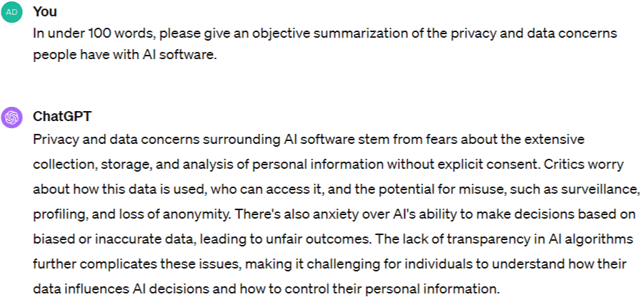Inbound Marketing Blog
for Manufacturers and Healthcare Companies
AI in B2B Marketing & Content Writing: How it Works (or Doesn't)
I’ve always been fascinated by robots.
My favorites – undoubtedly – are R2-D2, and yes, even C-3P0. Cortana from the "Halo" video game series is pretty cool, too – we’ve waged war against the Covenant many times together. Cylons (from "Battlestar Galactica") and the robot from "Rocky IV" are also in my top 10. (Shame on the 2021 director's cut for removing Paulie's beloved birthday present.)
While those droids and artificial intelligence (AI) are firmly rooted in the world of science fiction and a few clever builds at fan conventions, we're getting closer each day to robot counterparts becoming the norm.

(Remember this? Sylvester Stallone doesn't.)
If you’ve done a Google search for outsourced writing services or working with a content marketing agency, you’ve come across news stories and ads for AI.
“Write blogs faster!” “This post was written by a robot, & it’s working!”
For any company looking to gain ground on the internet via a robust content marketing strategy, these ads are hard to ignore. Who wouldn’t want to dominate search engine rankings with a robot assistant doing all the hard work?
However, the fact is AI-generated content is a ways away from being flawless and completely effortless. In addition, it’s nowhere near being able to outright replace a writer.
What makes me say this? I’ve experimented with AI content creation a bit.
And as a professional writer, I’m not worried about AI’s presence in B2B content marketing.
What Is AI in B2B Marketing?
Truth be told, automation is probably already all around your sales and marketing processes, either at work or in your personal life.
Website chat windows solve simple FAQs that would be a waste of Customer Service's time. Automated email sequences kick off the moment a lead downloads an e-book or shares its email address at a trade show booth.
AI-assisted content is a mushroom cloud-sized explosion of these concepts.
 The most common tool in B2B AI marketing is the conversational chatbot (see: ChatGPT). The software uses machine learning to respond to pretty much any question or directive you give it.
The most common tool in B2B AI marketing is the conversational chatbot (see: ChatGPT). The software uses machine learning to respond to pretty much any question or directive you give it.
They work like this:
- You type a prompt into the software.
- It creates an output based on its pre-studied knowledge of billions of web-published pages. (Some AIs can also perform web searches to find new information.)
- You iterate (as necessary) with more prompts until you're happy with the output detail, quality, and style.
Think of GPT-style software as an a more interactive version of Google Search, or perhaps as the world's smartest intern on Day 1. A SaaS AI chatbot can suss out the intent of complex, specific questions and *usually* offer a human-quality response.
(DYK? By clicking on CAPTCHA login checkpoints that say "find the images containing stop signs," you've helped an AI learn.)What Does AI Exactly Do re: B2B Marketing?
So what can an AI in B2B marketing and content production do?
Plenty.
Like most automation, robot-written and -strategized content has a few selling points that are hard to argue:
- A finished piece arrives a lot faster
- A robot can be an expert on practically any topic
- AI is ready to work 24/7 and doesn’t need company benefits or potty breaks
Here are the biggest use cases for AI in inbound marketing:
- AI can save content production time – Need marketing quick wins? If your prompts are clear and thorough, AI will cut down the time it takes to write content. You can also use it for repurposing – for example, feeding it your finished blog post and asking it to create social media posts promoting it. Any time saved is time you can use to add polish or simply keep up with your demanding schedule.
- AI can clear up writer’s block (or bad writing) – For a writer, there’s nothing more frustrating or humbling than being at a loss for words. For a non-writer, receiving a task that involves writing might "prompt" you to have night terrors. In fractions of a second, an AI can produce the word(s) you’re missing and give you something to work with.
- AI can safely do some research – AI can do the heavy lifting of seeking out general information and summarizing or rewriting it. For instance, if you want to write about what each golf club does in Tiger Woods' bag, an AI can easily do that, saving you the hassle of researching each driving implement individually.
- AI can measure your approach against what's out there – AI can give a comprehensive(ish) overview of a topic's biggest opportunities, challenges, and actionables. While you don't want to parrot everything competing websites are saying, a robot's insights can help you avoid missing a key talking point. By scouring sites that rank highly for a topic of keyword, AI can relay what your potential customers expect to see on your page.
- AI can optimize B2B strategies – Marketers can put specific goals and target-audience traits into an AI system, and receive a vast amount of data analysis in return. Software such as ChatGPT can identify lead-behavior patterns and broader content topic opportunities. Based on this analysis, it generates or recommends marketing actions that may boost your efficiency, customer engagement, and marketing ROI.
Warning: You'll get what you pay for. That includes both your investment of dollars and, even more importantly, your marketing team's effort. AI-generated B2B marketing content still requires careful prompting and a personal touch, lest "your" work look like a clone of 1,000 other pages competing for attention.

("Which one of you is Marty, again?")
<Insert Prompt>: What AI in Marketing DOESN'T Do
When you get down to it, fully AI-produced pieces of content are like automated phone systems. While they’ve become better at anticipating and responding to need, they still need a human to provide guidance – and plenty of it.
To be more direct: you can't purchase access to an AI content generator and expect fully finished work to start churning out.
In niche B2B marketing, AI is only as good as the input you give it. It's a tool, not a full solution. An AI that writes is no different than the Trade Federation’s battle droids in "Star Wars" or the drones in "Spiderman: Far From Home." Even Watson struggled to answer questions on "Jeopardy!"
Indeed, working with an AI to create a piece isn’t a simple matter of telling it the topic and copy-pasting the output. There is very much still a writing process.
Though technology has come a long way, we’re not at the point where it fully understands context, nuance, or intent … yet. There’s still a lot of room for error and misunderstanding. Until that day comes (which will hopefully look nothing like Judgment Day in "The Terminator" franchise), what we’re left with is nothing more than an artificial intelligence that’s a far cry from anything you’d see in a movie.
In my "customer experience" with AI, I’ve found:
- AI doesn't make you Stephen King – This is probably the most important point. Think of it this way, even with an expensive set of golf clubs, someone who’s never held a driver before doesn’t play a round with Tiger Woods-level skill. To that end, while you may know your way around a sentence, an AI won’t make you a seasoned wordsmith.
- AI can't adapt as quickly as you'd think – Yes, you read that correctly. AI is almost completely dependent on crowdsourcing as a mechanism to learn. It needs to “see” things thousands upon thousands of times and review scores of data before being able to make a quick decision. Also, a model that lacks a live-search feature can't offer information or context beyond the cutoff date of its "knowledge training."
- AI doesn't always write well– At first glance, that giant paragraph or blog post section AI spits looks great ... until you get into the weeds. Then, you might notice issues like odd phrasing, some grammatical/mechanical errors, and even wordiness. What's more, it can be redundant. It’s not that AI will say the same thing the exact same way multiple times per se, but it does have some go-to phrases that it reuses often – e.g. “it is extremely important.” Those redundancies are something that can hurt your search engine rankings.
- AI can't quite write for SEO/inbound – You'll need to train AI to use the right keywords (which it sometimes fails at anyway), and it won't insert internal and external links. It's best to handle the SEO aspects on your own, while making sure the AI's writing is engaging and education-first.
- AI might give you the security heebie-jeebies – Most generative tools collect and "process" everything you tell it. For example, ChatGPT's free version uses your chat history to improve its model, meaning your input could someday influence another person's output. Avoid sharing sensitive data unless your AI platform and service plan explicitly say they don't process user data ... and even then, maybe still don't.

(See? It truly is self-aware.)
- AI doesn't live in your or your audience's shoes – The person you’re writing to might be an astrophysicist who enjoys a hyper-technical writeup. Or it could be an engineer at an OEM trying to solve a problem. Telling an AI about your target audience is helpful, but it still can't offer specific examples like you can. Nor can it bring new ideas to the table based off years of hands-on experience.
Warning: The AI-in-Marketing Debate May Cause Flashbacks

I remember the day I got my first cell phone.
It was 2003. The "Lord of the Rings" trilogy was wrapping up in theaters, and it was a breakout year for Kelly Clarkson. I was a junior in high school, and my parents were due for phone upgrades.
My father, a crime reporter at a major metro newspaper, had already long enjoyed the freedom mobile phones brought. On the other hand, my mother rarely looked at her cell phone, and it found a semi-permanent home in the dark recesses of her purse.
When my parents upgraded to a matching pair of white Nokia phones with blue backlighting, their old phones were up for grabs. I took my mom’s old phone, as it was in near-pristine condition, Game Boy-esque green screen and all. I preloaded with 1 whole hour of minutes. Other than calling my parents to ask for a ride, there wasn’t a whole lot I could do with the phone.
Still, there was a sense of stepping into something bigger, even if it was throttled by limited minutes.
 As cell phones found their way into the pockets and purses of millions, there was still a loud contingent of folks against this technology.
As cell phones found their way into the pockets and purses of millions, there was still a loud contingent of folks against this technology.
- “They’ll cause cancer!”
- “They’ll down planes!”
- “Our pets will be driven crazy by their radio waves!”
Suffice it to say, times changed. The masses adopted cell phones, and no docile canine ever went full Cujo after sitting next to one. It’s become almost impossible to live without a cell phone.
Maybe we're seeing the same with AI content generators. The early adopters are turning into veteran users, and artificial intelligence for content is becoming more accessible to the tech-unsavvy.
(DYK? The Associated Press was one of the first organizations to use AI to generate content.)
Now, more organizations are looking into AI for content generation and marketing. There’s a chance you’ve already read AI-written content at some point today. (No, not this article.)
Perhaps you've wondered where this leaves dusty, ol' search engines. Google and other companies were initially hesitant to welcome AI-generated content. Now, they seem to believe it's do or die.
Microsoft surprisingly has made Bing relevant again by pioneering the use of AI in deciding what search engines show users. Google isn’t too far behind, adding a slew of generative AI features by the month.
How Is AI Changing B2B Marketing? A Replacement? A … Friend?
Conversational and generative AIs are impressive tools. But without a human in the driver’s seat, a content-producing AI aren't able to do much.
Will AI replace content writers or the need to work with them? Not anytime soon. There’s no way to clone the human element needed to create compelling copy or the expertise required to identify and adapt to the way the internet works. Pre-programmed parameters only go so far.
Still, the future of AI B2B lead generation and writing is exciting. Who wouldn’t be eager to try out a tool with the potential to boost your online presence?
For now, we’re at the very beginning of a revolution in the human-machine relationship – one that will *likely* take decades to figure out.
But just in case – for the record, I, for one, welcome our new robot overlords.
(Editor's note: This article was originally published in March 2023 and was recently updated with fresh insights.)
Our Blogs, Direct to Your Inbox!
How to Audit your Online Marketing
If you are executing digital marketing, congratulations! You are most likely already one step ahead of your competition, and making strides to meaningfully connect with prospects online. But, how do you know if you’re seeing continual success year over year, and improving your metrics?
Without the tools in place to analyze and benchmark your efforts, it is impossible to scale your online marketing and ensure continuous success.



